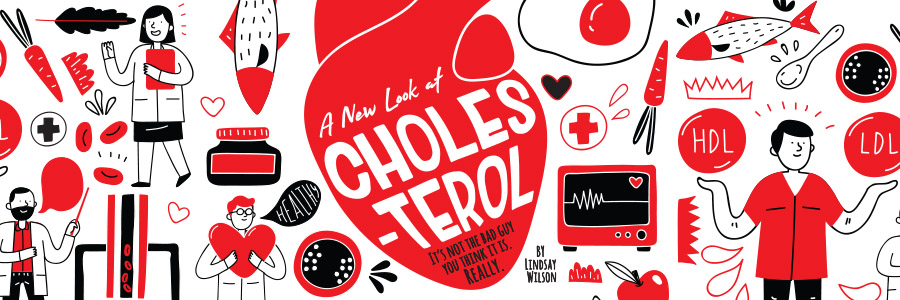


Sign-up for {N}power to get exclusive discounts, newsletters, members-only features, and more!


Cholesterol is so vital to human health that our bodies don’t rely on diet to provide it—most of the cholesterol found in our bodies is not from food but made via the liver and intestines (20% vs 80%).3 It is a key building block for hormones, including estrogen and testosterone; it is required to make vitamin D; it gives cell membranes stability, keeping them healthy; it is involved in cellular communication and normal apoptosis (cell death); and it helps our bodies absorb the fat-soluble vitamins A, D, E, and K. The body works hard to maintain cholesterol homeostasis, or balance, and will reduce or increase endogenous production as needed.4
There are two major types of cholesterol: High-density lipoprotein (HDL) and low-density lipoprotein (LDL). In general, LDL delivers cholesterol to tissues throughout the body, while HDL brings cholesterol back to the liver for excretion. You will likely have heard that LDL is “bad” cholesterol and HDL is “good” cholesterol. But LDL is not inherently bad—it becomes unhealthy when it is oxidized, or damaged by free radicals.5
Further, there are specific types of LDL which determine how susceptible it is to oxidation, and thus whether it is problematic. Large, fluff y LDL is known as “pattern A” LDL, and it is associated with a lower risk of cardiovascular disease (CVD). Then there is small, dense LDL known as "pattern B” LDL that is more vulnerable to oxidation and is significantly associated with an increased risk of heart attack.6 7 Pattern B LDL is also associated with higher levels of triglycerides, another predictor of CVD.8 And it is a diet high in refined carbohydrates, particularly sugar—not cholesterol—that increases levels of pattern B LDL and triglycerides. 9 10 11 12
CVD is a complicated process, but some of the major risk factors include chronic inflammation and oxidative damage, high blood pressure, and chronically elevated blood sugar and insulin levels. Cholesterol is not a driving factor for these. Sugar is. Trans fats are. And an excess of refined and processed carbohydrates are. The best diet to support long-term cardiovascular health is one that is low in processed and refined carbohydrates and rich in a variety of colorful vegetables, healthy fats (extra virgin olive oil, organic butter and ghee, coconut oil, unrefined avocado oil, etc.) moderate protein, and some nuts and seeds.13 14 This is a dietary lifestyle that will reduce inflammation and oxidation, help you maintain balanced blood sugar and insulin levels, and support healthy blood pressure—all things that reduce your risk of CVD.
In addition to adopting a healthy diet, consider some of these supplements that have a proven track record in supporting overall cardiovascular health.
This potent plant compound has been found to have a positive impact on several markers of cardiovascular health, including improving the ratio of HDL to LDL cholesterol, improving endothelial function, and suppressing inflammation. One review of existing studies found that berberine significantly reduced total cholesterol, triglycerides, and LDL cholesterol, and resulted in a “remarkable” increase in HDL cholesterol.15 16 17
Try 1,500 mg in divided doses daily.18
Numerous studies support the cardiovascular benefits of the omega-3 fats EPA and DHA, including their ability to reduce triglycerides, blood pressure, and inflammation. In both observational studies and clinical trials, higher levels of EPA and DHA are associated with a lower risk of sudden cardiac death (heart attack). Some research has also found that DHA in particular can increase the particle size of LDL cholesterol (remember, it’s the smaller particles of LDL that are associated with an increased risk of heart attack).19 20 21 Studies have generally used 3–4 grams of combined EPA and DHA daily.22
The body’s “master” fat-soluble antioxidant, vitamin E protects against the oxidation of LDL cholesterol, a risk factor for atherosclerosis. Large population studies have shown as vitamin E intake increases, the risk of heart attack and death from heart disease decreases, and the results of the Vitamin E Atherosclerosis Prevention Study found that supplementing with 400 IU of vitamin E daily significantly decreased circulating oxidized LDL cholesterol and also reduced LDL’s susceptibility to being oxidized.23 24 25
Try 400 IUs of natural source D-alphatocopherol daily.
This essential mineral plays a key role in hundreds of different biochemical processes in the body, including the regulation of heartbeat. In one study, researchers at the Harvard University School of Public Health determined that high blood levels of magnesium are associated with a significantly lower risk of developing cardiovascular diseases, including ischemic heart disease.26
Try 300-400 mg daily.
Research has shown that people with low levels of vitamin D are significantly more likely to experience a heart attack, heart failure, or stroke. In addition, people with low vitamin D levels are also more likely to have high blood pressure.27 28 Deficiencies in vitamin D are common; it’s important to have your vitamin D levels checked and aim to maintain them between 40-80 ng/mL.29
For most people, 4,000–5,000 IU daily is beneficial.
This form of vitamin K (unlike K1, which is found in leafy greens, K2 is found in pasture-raised animal products) is necessary to activate proteins that ensure calcium is deposited in the bones and teeth and removed from soft tissues like the arteries. These proteins play a signifi cant role in the prevention of atherosclerosis. The Rotterdam Heart Study, one of the first large-scale population-based studies that looked at the connection between K2 and heart disease, revealed that subjects who consumed the largest amounts of vitamin K2 in their diet experienced a 57 percent reduction in death from heart disease compared to people who consumed the least amount. They also had less calcium buildup in the aorta.30 Studies have found that 45 mcg daily is associated with a reduction in arterial calcification and cardiovascular mortality.31



Sign-up for {N}power to get exclusive discounts, newsletters, members-only features, and more!